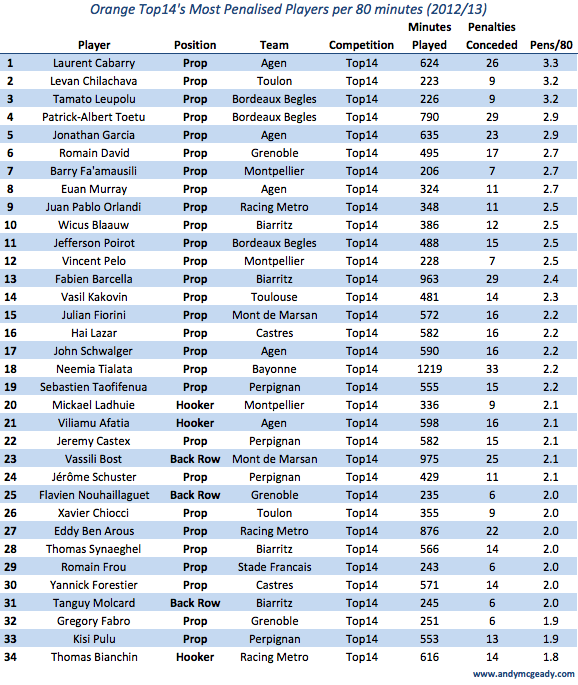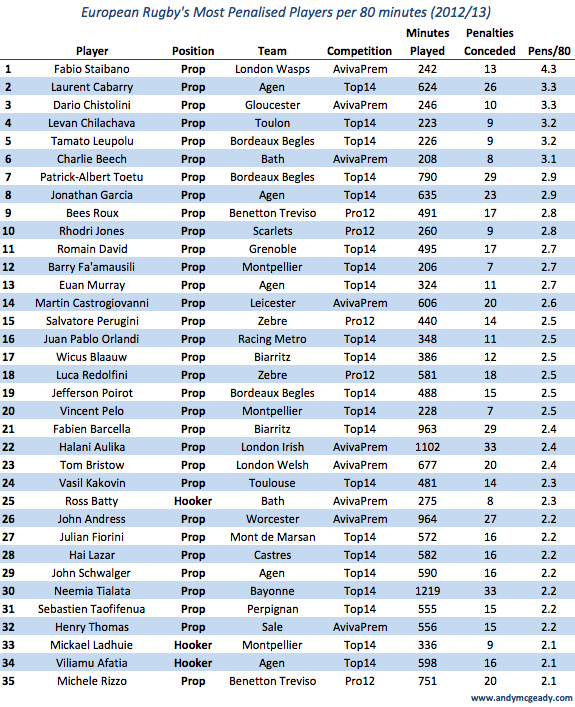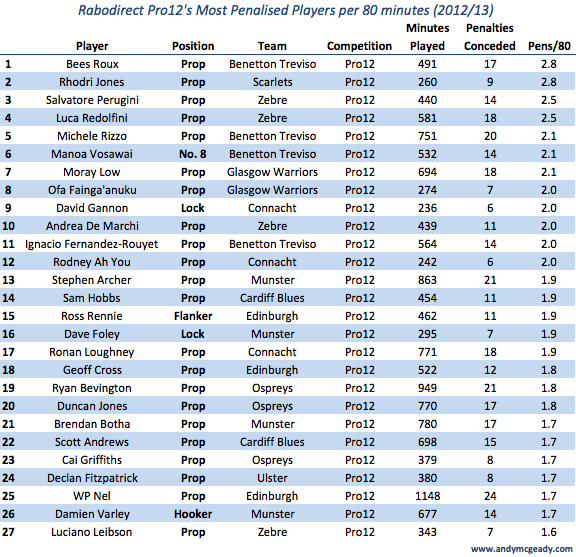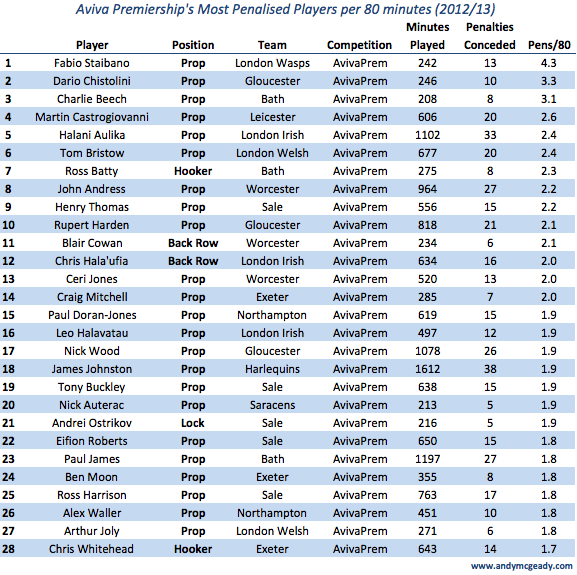European Rugby’s Most Penalised Players in 2012/13
Last weekend saw the start of the new rugby season in France as well as first game of the Rugby Championship in ANZ Stadium in Sydney where the hosts got a hiding. The Qantas Wallabies, such as they are, conceded over forty points for the second match in a row (and at home, no less), something that had never happened in over one hundred years of playing as “Australia”. In France there was the much-anticipated debut of Jonathan Sexton along with retired Irish rugby legend Ronan O’Gara’s first competitive outing as a coach. Interesting times.
Scorelines aside, the one facet of the game that everybody in rugby will have been looking at last week was the scrum. The new engagement sequence introduced by the IRB has two key factors; firstly the elimination of the “hit”, which was never mentioned in the laws of the game in the first place, and secondly the enforcement of the straight feed by the scrum half.
The very first scrum in the aforementioned Wallaby-pounding contest saw South African referee Craig Joubert call a free-kick against Australian halfback Will Genia for a crooked feed. The next scrum was fed by Kiwi halfback Aaron Smith – the feed had looked idential to Genia’s just moments previously but was allowed to continue by Joubert. Things evened up later in the contest with scrum feed calls against both sides but in just those first two feeds the need for consistency was highlighted.
As rugby union takes the courageous step of insisting that its officials apply the existing laws of the game, it was disappointing to hear Tim Horan, co-commentator in ANZ Stadium, say that he hoped the referees “wouldn’t be too pedantic”. Considering the farcical state of the scrummage and the potentially crucial role of the straight feed in encouraging a contest for the ball as opposed to extended games of “Penalty Lottery”, this comment was disappointing.
The new approach to scrummaging and the associated scrutiny on the halfback’s put-in might seem pedantic to some, but only to those with the memory of a goldfish.
Last season after the group stages of the Heineken Cup I published a table of the most-penalised players in the competition. The top sixteen were props to a man. This stat got quite a bit of interest, versions of it being mentioned by Brian Moore in a BBC radio documentary on the state of the scrum in the modern game as well as on RTE television by rugby commentator Hugh Cahill.
However, in terms of games the Heineken Cup is a short competition and the pool stages are shorter still. Was it possible that this propping villainy was just a fluke? A quirk of the sample-size gods?
It’s a fair question to ask.
Taking the top league competitions in the Northern Hemisphere – the Rabodirect Pro 12, Aviva Premiership and the Orange Top 14 – I threw every player’s season-long Opta stats into the mixer and put together the list of the most penalised players per 80 minutes (note: minimum 200 minutes played).
Pro 12: 23 of the top 27 were front rows
Aviva Premiership: 25 of the top 28 were front rows.
Top 14: 28 of the top 30
 And finally, taking 2012/13 top level league play as a whole, the top 35 most-penalised players in Europe were all front row forwards with the top 24 being props without exception.
And finally, taking 2012/13 top level league play as a whole, the top 35 most-penalised players in Europe were all front row forwards with the top 24 being props without exception.
Pro 12, Premiership and Top 14 Combined: 35 of the top 35
 This is just one indicator demonstrating why a new scrummaging approach was needed. There will be an adjustment period, certainly, and referees will need to watch for hookers having their foot raised early (another perfectly fine existing law) to avoid the whole thing looking a bit “leaguey”. But the need for change should not be forgotten.
This is just one indicator demonstrating why a new scrummaging approach was needed. There will be an adjustment period, certainly, and referees will need to watch for hookers having their foot raised early (another perfectly fine existing law) to avoid the whole thing looking a bit “leaguey”. But the need for change should not be forgotten.
Next, the Southern Hemisphere – land of commentating goldfish or bastion of scrummaging soundness?
Credit: raw player statistics courtesy of Opta



Comments
One Response to “European Rugby’s Most Penalised Players in 2012/13”Trackbacks
Check out what others are saying...[…] a previous piece I wrote about last season’s most penalised players in European domestic league rugby, in which props proved themselves to be extraordinarily popular at the top of the charts. And I […]